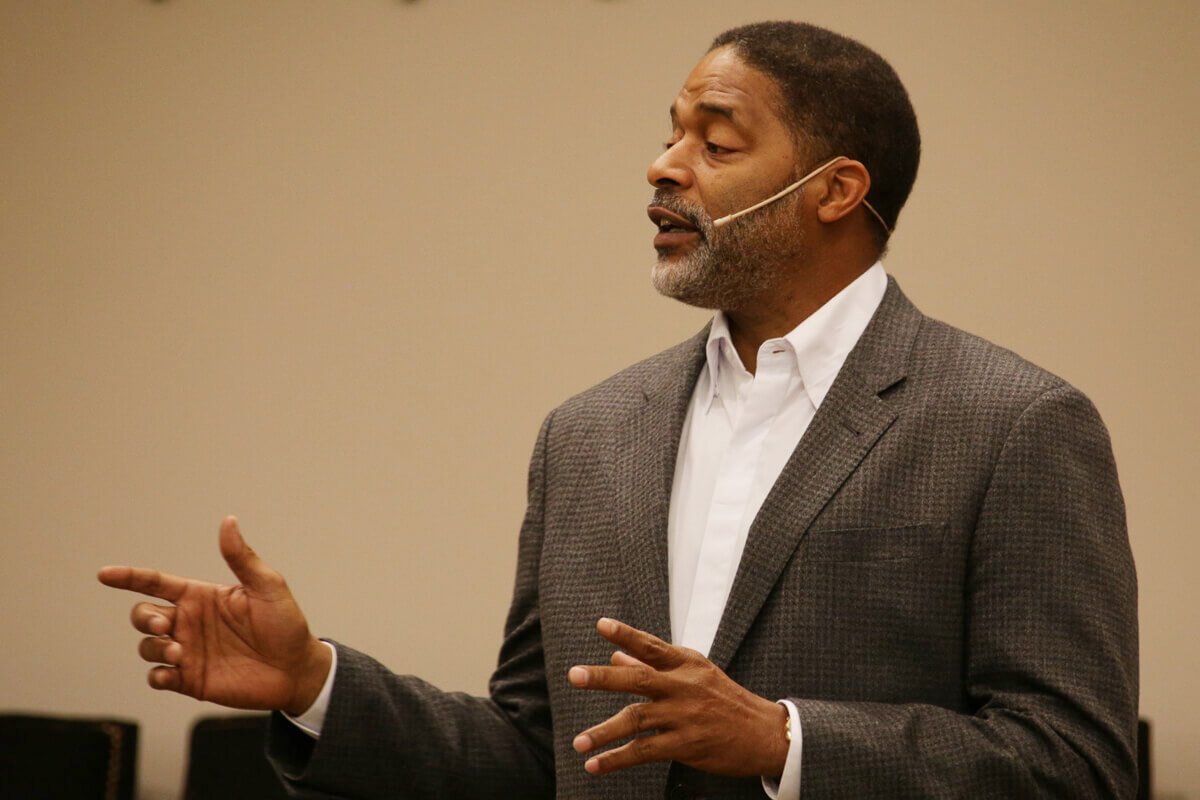For Norm Nixon, success isn’t just a business proposition. So when he talks about being a good business person or entrepreneur, he tends to take a more holistic approach. He’s not a follow-these-steps-and-you’re-guaranteed-a-great-career kind of guy.
Instead, Nixon asks, “What is your real purpose?”
Nixon presented his unique perspective on business and life as the keynote speaker for the Harry F. Byrd, Jr. School of Business’ Seventh Annual Business Symposium on March 19.
“I’m not the typical entrepreneur,” admitted Nixon, a retired NBA star, entrepreneur/real estate investor, onetime sports/entertainment agent, ABC television basketball commentator, and executive director of the Debbie Allen Dance Academy (DADA) in Los Angeles, which he co-founded with his wife, famed dancer, choreographer, director, actress and writer Debbie Allen in the city they call home.
Nixon said his post-pro-basketball business career has provided him with the ability to focus on the dance academy and work with young people, which he finds extraordinarily fulfilling.
The path from basketball to business to helping young people build careers may not seem particularly linear, but in Nixon’s case, it is. Nixon grew up in Georgia and played for Duquesne University in Pittsburgh before heading to the Los Angeles Lakers in 1977 and then the San Diego/Los Angeles Clippers in 1983. He retired from basketball in 1989, after 12 seasons as a pro. But, he always had the future in mind, even as he played. He attended real estate school after his fourth year in the NBA and started syndicating properties shortly thereafter. So, it’s not totally surprising he looked to business as a place to seek out the kind of passion he had for basketball. “I was kind of a numbers guy in college,” he said, and noted that he once thought of attending medical school.
He also discovered he liked the art of the deal: making deals and closing them; being the behind-the-scenes guy who made things happen. Early in his career, he also focused on sports/entertainment management, serving as an agent for athletes like the NBA’s now-retired Jalen Rose (during his playing career), Peter Warrick (No. 4 pick in the 2000 NFL Draft), Al Wilson (five-time Pro Bowl linebacker for the Denver Broncos) and rapper/actor LL Cool J. But he didn’t find that particular world satisfying and after about 10-15 years, he shifted away from it.
In 2001, he and Allen opened DADA, and his role there has proved to be one of the most meaningful in his life. “You just fall in love with all these kids,” he said. The non-profit dance school provides training in a wide variety of dance styles, and mounts performances across the United States.
In addition, NBA teams will call him in to talk to young players, and he has used his stature and connections to help raise awareness about the 2015 Special Olympics’ World Games, being held in Los Angeles.
As his career has wound into so many different areas, he has been buoyed and sustained by his passion for work and a continual urge to grow. “You never stop developing yourself,” is Nixon’s family’s mantra, he said.
Tapping into the passion that propels growth is kind of like athletic conditioning, he said. In a sport, “you run until you get tired — and then you do conditioning.” In business, you work those extra hours and extra days, but when you have passion, the work isn’t toil. “It’s not a job,” he said.
But life isn’t just about business growth, and just because a person is a successful entrepreneur, that doesn’t mean he or she will be successful in life, he noted. “Some of my most miserable friends are my wealthiest friends.”
In his symposium keynote address in Stimpson Auditorium, he gave his audience an “assist” in the form of business advice born from his years in basketball. The term “assist” is one from basketball, when one player helps another score. Nixon’s symposium assist was composed of a few major points:
- “All pros are made in the off-season,” he said. In basketball, that means that work never stops when it comes to getting better and understanding the game, with a long-term goal of winning a championship. “All great players are students of the game,” he noted. As a businessperson, “you understand your business,” he said, watching trends and industry shifts to make the right calls.
- Colleagues and employees are a businessperson’s teammates. Just like in sports, you need to know your teammates’ skill sets, strengths and weaknesses to help them maximize their potential. In addition, “You must encourage your players. You must reward effort.”
- Connect with your marketplace, and know your competition, inside and out. Don’t be afraid to borrow best practices from your competitors, either, he said.
- Great players are the ones who perform. Just as it is on the court, leaders must accept responsibility. “You have to step up,” he said. And then, after preparing yourself well and gathering the information you need, you have to act. “At some point, you’ve got to put in on the line and you’ve got to play.”
- You’ll do better if you’ve conditioned yourself to win, he noted, and that means being willing to put in all the extra time necessary to do well. “Sacrifice is the key to success,” he said, also admitting that he’s loved all the long hours he has put in during his career.
But when asked by an audience member about his greatest business decision, Nixon responded with a personal one: “marrying my wife.”
Just like he always said, Nixon isn’t your typical entrepreneur.




